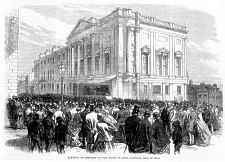
[ILN 20 April 1867]
THE House of Keys, which is the title of the local Parliament of the Isle of Man, exercises a considerable share of legislative power, dealing with various subjects of civil and criminal law, and with the customs tariff of the island, as well as its police administration and the maintenance of its public works and highways. A Reform Bill, establishing the electoral franchise on the basis of an £8 rating, was lately passed, with the Royal assent, and has now come into practical operation. The general election for the new House of Keys took place, under the writ issued by the Lieutenant - Governor, in the first days of this month, in the towns of Douglas, Ramsey, Castle-town, and Peel, for those constituencies ; and also for the districts, or "sheadince," of Middle Sheading, Garff, Rushen, Ayre, Michael, and Glenfaba. The reports of the speeches at the nominations, and the comments of the Manx newspapers, show a healthy activity of political opinion, and a laudable ambition to compete for the honours of public service, without any spirit of factious or personal animosity. It may be remarked, as an example of the difference still existing between the social and legal condition of the Isle of Man and that of every county in England and Wales, that one of the most interesting topics of discussion was the proposed repeal of the usury laws ; another was the question of introducing a poor law, as no poor rate has been hitherto levied ; and it seems that the islanders are likewise exempt from all stamp duties and assessed taxes. The nomination of candidates for the three representatives of the town of Douglas, which is really, though not officially, the capital of the island, took place on Tuesday, the 2nd inst., upon a hustings in front of the Courthouse in Atholl-street. The High Bailiff acted as returning officer. The street was filled with a crowd of the townspeople, who cheered the rival candidates and committees of the Red party at one side of the hustings, and of the Blue party at the other. The gentlemen proposed and seconded were four in number— Mr. W. Dumbell, of Belmont ; Mr. W. F. Moore, of Cronkbourne ; Major J. S. Goldie Taubman, and Mr. Richard Sherwood ; the last-named candidate, Mr. Sherwood, appearing on the Blue or Radical side, in opposition to Mr. Dumbell. The show of hands was very much against Mr. Sherwood. A poll was demanded on his behalf, and took place next day, the votes being received in the magistrate’s room at the Courthouse and in a booth on the south side of St. Matthew’s chapel, in the market-place. This operation went on from eight o’clock till four in the afternoon, the returns, as in our English elections, being made up and published every hour. The day was kept as a sort of holiday by many people, who strolled about the streets, or sat at the windows of their houses, to watch the processions, with their bands of music and their display of flags and placards. The result was that Mr. Sherwood was at the bottom of poll, having but 317 votes
[Building is old Courthouse, Athol Street]
|
|
||
|
Any comments, errors or omissions
gratefully received The
Editor |
||